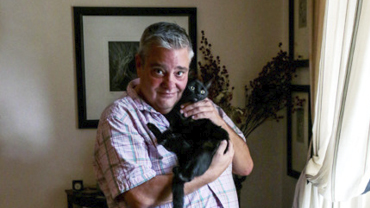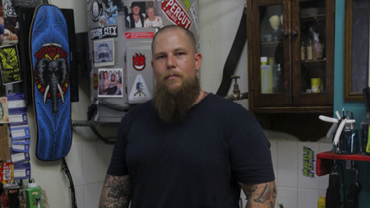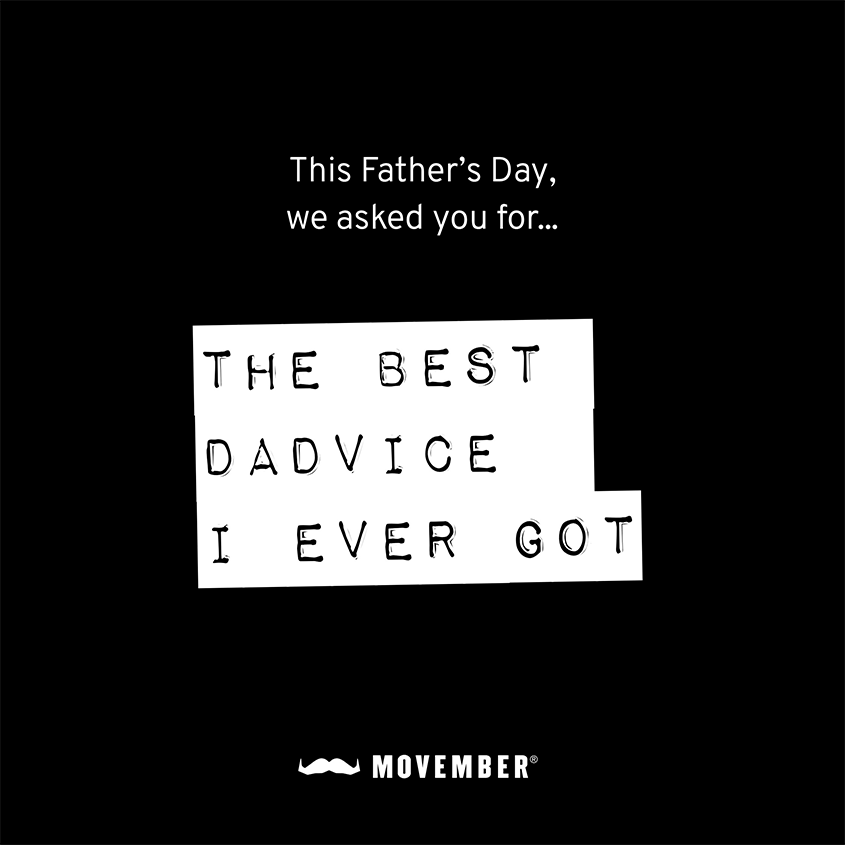This is mine.
WHERE IT ALL BEGAN
I’ve never really considered myself someone who was struck by poor mental health…but hindsight suggests otherwise.I guess it all really started around 2003 when I left the nest and enrolled at Cal Poly San Luis Obispo on a baseball scholarship. Life before that was by all accounts incredible…amazing family, close friends, great girlfriend, and a budding baseball career that was taking shape. It’s easy to think you’ve got the world on string with a line-up like that. But going away to college was really the first true test of character that I ever encountered…a major rite of passage for anyone really. So you go off, “full of hope but with a heavy load” to quote one of my favorite songs. The proverbial load consisted of blowing up your social circle, leaving family behind, acclimating to new environments and schedules, and really just trying to establish your identity for the first time in your life.
For the first few months, baseball helped allay that load. It provided structure to my life, gave me a social circle and camaraderie, and allowed me to seamlessly integrate a major part of my past identity — that of an athlete. It wasn’t long before the fabric of my life began to fray. The winter break signaled the end of the first real relationship I had with my high school girlfriend, the announcement that I would be “redshirted” on the baseball team (you save a year of eligibility, but you cannot play for the team officially — just in practice), and the nagging pain in my right shoulder had quickly escalated to something unbearable. Little did I know that these life events would push me down the slippery slope of physical stress, debilitating anxiety, and a pretty healthy dose of depression.
What I would come to find out in the three years I spent at Cal Poly was: one, it’s impossible to find new love when you’re too busy being angry or remorseful for love lost; two, rebuilding your identity takes a lot longer than just a few years; and three, the word “catastrophic tear” is something you don’t want to hear from a surgeon after they’ve operated on your shoulder. Looking back now, this is where my first “Crisis of Self” took root. Everything was feast or famine with emotions — finding a girl was out of the question, baseball was taken away with three anchors in my labrum, and the easiest way to assimilate to the herd was to drink my fair share…a great social lubricant, but as my dad always told me, “all’s fine in moderation.”
As I started to get back in the saddle again with baseball after my surgery my sophomore year, another cruel trick of fate would befall me: I developed the Yips.
“The Yips is no mythological plague. For reasons unknown, players can encounter a mental hurdle that flat-out won’t permit them to complete one of the game’s mundane on-field tasks. Infielders suddenly can’t find the first baseman’s glove on routine throws. Catchers can’t execute the simple task of returning the ball to the pitcher.” -Zack Meisel / MLB.com | May 10th, 2013
In baseball circles, the Yips is a blasphemous term if spoken out-loud for fear that just hearing the term will render you unable to throw the ball accurately. In my case, the act of throwing a baseball back to a pitcher — something I had done hundreds of thousands of times in my life — became impossible. After rehabbing for 18 months and finally recovering physically from my shoulder surgery, I had to watch any hope of playing the sport that I loved go out the window as succumbed to the debilitating performance anxiety that characterizes the Yips…physically capable, mentally ratteld.
The ups & downs seemed to come at me simultaneously…I developed the Yips and was a massive defensive liability for my team, but I managed to put together a strong performance at bat, putting up some great offensive numbers in what would be my final year at Cal Poly in 2005. It was during this 2005 season at Cal Poly that I first sought help from a sports psychologist, thinking my mental problems were isolated to the baseball field. When we first sat down, I was fully prepared to have dialogue expressly about baseball and my focus on the game, only to be surprised that the lion’s share of our discussion were about everything that I considered to be on the periphery. Purpose, identity, and process became common topics of discussion exposing just how unstable the foundation of my psyche truly was. But of those three themes, the good doctor always got me back to the discussion of process — having faith in it and having focus on it. Mind you, very rarely was baseball discussed in this sessions.
The shift of focus from the grander themes of purpose and identity to the chronology of process, was my first real epiphany that would help me navigate this “crisis of self” that I had felt myself slip in to. The premise was (and still is) simple: by focusing on the process and controlling the controllables, I could focus on things in front of me as opposed to life on the periphery, which is where anyone’s goals, hopes, and dreams ultimately lie. Faith in the process…the first key understanding that helped me quiet my anxiety, manage my stress, and help me redirect this depressive backslide I was going through.
FAITH IN THE PROCESS & RECOGNIZING THE PATTERN
It has been said that the definition of insanity is doing the same thing over and over again, but expecting different results. By this definition, my decision to leave Cal Poly in 2005 and transfer to USC was insane. For three years I worked my ass off to develop an identity, create a strong social circle that gave me some of the best friendships a guy could ask for, and a couple shots at great loving relationships. Moreover, I had begun to breakthrough in my work with the psychologist and better understand the things that made me tick. Perhaps it was my newfound “faith in the process”, but in one decision, I decided to wipe away all that work and start fresh at USC “full of hope but with a heavy load.”Armed with my newfound “existential” belief in the process, and some evolved hope provided by a series of little victories the year prior, I jumped at an opportunity to enroll at USC and join the most storied baseball program in all of college athletics. I thought that USC would be a critical step in my process. Not only would joining USC’s high profile baseball program hopefully get me closer to one of my dreams of playing professionally, but it also came with a built-in contingency plan — a respected degree and the alumni community we all call the Trojan Family.
And so it began…the vicious process of recreating my identity amongst a new set of peers. I remember telling myself to keep perspective and focus on the process, but only a couple months in to my time at USC and I found myself succumbing again to a defeated psyche, undermined by the same factors that took me down three years prior when I started at Cal Poly. I had a significant relationship lost that Fall, coupled with a complete fall from grace for baseball later that Spring which is when I really found rock bottom. Dreams dashed, hopes unfulfilled…“so it goes” as Vonnegut would say.
The silver lining in this “relapse” was that I was somewhat aware of it. I recognized the pattern of highs and lows and could feel myself swinging back and forth between the two, when all I really wanted out of it all was to be content…saddled in the middle of dreams and despair, and happy with the life in front of me.
And this is where I would find my second epiphany to manage these “crises of self”…life is best lived in the middle. You make the leap of faith and focus on the process, and that faith in the process is what protects us all from the dreams and despair that are always on the periphery.
NOT THE FIRST, WON’T BE THE LAST
My times at Cal Poly and USC weren’t the only times that I’d succumb to the cycle of stress, anxiety, and depression — nor will they be the last. With any new walk of life, I still find myself entering the cycle. It happened when I graduated from USC and finished up playing baseball, it happened when I started to hunt for a career, and it still happens today.The thing is, I can now see the cycle coming and better address it when it does sweep me up. The cycle is bound to happen with any shake-up that may come in your personal, professional, or social lives — my “buckets” as I’ve come to refer to them. The loss of health, head, and heart are constant realities in any of those three buckets of life, but here I am today armed with the right perspectives to address, embrace, and persist through the good and the bad.
SO HERE I AM…
So here I am…content. But it’s been a long journey to get here. Retrospect would show me that I only took action in my life because of my anxiety on the baseball field, but would have never considered myself unstable in other facets of life because I never got to a point where I considered taking my own life. The interesting thing to note, and something I commonly hear from men when having an honest conversation about their state of mind, is that because they never felt like they were a risk to take their own life or engaged in other forms of drastic behavior, they never spoke up, considering their plight not a serious one. The sad undertone in that statement is twofold: men feel like the finality of suicide is really the only warning sign for them, and that they marginalize their own state of mind because they juxtapose it with severe depression and dire consequences.So here I am…My buckets are full, faith in the process ever-present, and enjoying life in the middle. I decided to write this journal because I wanted to share why I believe in the Movember Foundation and why I wake up every day striving to change the face of men’s health. I am fortunate to be in a position where everyday I can attempt to be the change in the world that I wish to see to paraphrase Gandhi. Many men endure the angst of poor mental health in silence. I hope this article can maybe give someone a little perspective in their life or even inspire them to share their own story of dealing with stress, anxiety, and depression. This is why I Mo.
SOME KEY TAKEAWAYS
- Self-Awareness is critical. Know where you stand in your life when it comes to the three main buckets of life (personal, professional, and social). If you aren’t happy and topped up in those buckets, take a step back, collect your thoughts, and start to focus on the process of getting them filled. If you are at a point where you can’t see through the haze to know where you’re at in life, then heed the advice and insights of those closest to you — they are your best barometer since no one knows you better. Remember, those buckets aren’t just a function of you…there are people around you that help keep those puppies filled.
- Control the controllables. Have you ever watched an athlete go through a ridiculous pregame ritual and chalk it up to superstition? The truth is they are controlling the controllables…by putting on their uniform the same way, eating the same pregame meal, and doing really weird things routinely on the field, they are neutralizing external pressures like the crowd or must-win situations. You can do the same thing in your life — focus on the process, control the controllables, and calm down the noise on the periphery. Above all, try to enjoy the process…that’s the good stuff.
- Know the triggers. Are you changing jobs, graduating from school, retiring from the professional world, or becoming a new dad? Your identity is about to change. The people around you, the schedule you maintain, and the role you play amongst the people and in that schedule are what defines identity. A shake-up in any of these might get you out of life in the middle.
- Find some outlets. Once I began to recognize my struggles, I turned to a few mediums to lighten my load. The first stop was music for me. That evolved into journaling — not to keep a history but to slow things down and achieve some perspective. The next was leaning on those closest to me who knew me best…they helped me recognize that I wasn’t being myself. And lastly, I sought professional help. All these channels are great cathartic outlets.
If you’d like to join me on this journey of men’s health, I’d invite you to join me this Movember and help us change the face of men’s health. Remember, the moustache is just the symbol of the organization — the furry ribbon on your upper lip. It’s the men’s health conversation that is the lifeblood of the organization. Come join me and visit my Mo Space here:
http://mobro.co/jmo4







.png)

